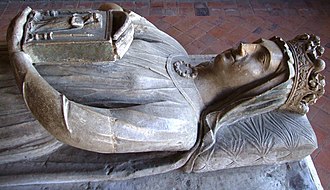 On May 18 of 1152 Henry II of England, the “almost Great,” married Eleanor of Aquitaine, the truly remarkable. Before congratulating the groom you might want to take a look at the turbulent personal and political consequences. But if you think the Middle Ages was a time when women had no rights and no social status, you might want to look at her and think again.
On May 18 of 1152 Henry II of England, the “almost Great,” married Eleanor of Aquitaine, the truly remarkable. Before congratulating the groom you might want to take a look at the turbulent personal and political consequences. But if you think the Middle Ages was a time when women had no rights and no social status, you might want to look at her and think again.
Eleanor was a member of the Ramnulfid dynasty whose name makes me think those Vikings were getting everywhere in the 9th century including Aquitaine. She was queen consort of France from 1137 to 1152, during which time she took an active part in commanding troops during the Second Crusade, and then Queen of England from 1154-1189. This marriage may have been in large measure dynastic in origin given that she was 18 years older than him. But she remained a spectacular beauty and bore him 8 children including Richard Coeur de Lion and John Lackland and was a patron of the arts and an ardent schemer who actually spent most of the last 16 years of her marriage imprisoned for supporting a revolt by her son Henry and two of his brothers against her husband Henry, before becoming regent while Richard wandered about on the Crusades or languished in captivity on his way home.
Many years ago my grad school roommate was a huge fan of the soap opera film The Lion in Winter about Henry II’s later days amid scheming sons and an imprisoned wife, with Peter O’Toole as Henry, Katherine Hepburn as Eleanor, Anthony Hopkins as Richard (!) and a young Timothy Dalton as Philip II of France (I didn’t know he was classically trained; Dalton I mean, not Philip). I don’t know if it was absolutely right on the historical details. But it certainly captured the general feel.
Even the wretched John, for some reason Henry’s favourite son, joined in the revolt-against-dad fun right toward the end, contributing apparently to Henry’s death partly from a broken heart. And there was no mistaking the outsized influence of Eleanor even in captivity. And when she became regent, freed on Richard’s orders by the remarkable William Marshal, she signed her orders “Eleanor, by the grace of God, Queen of England” and nobody dared say otherwise.
Obviously she was not typical, of medieval women or women generally. But nor was Henry II; most medieval men did not enjoy his powers, privileges or troubles, though doubtless many had plenty of their own. And whatever you think of Henry’s decision to marry Eleanor, on which he seems to have had grievous doubts over the years as did her first husband Louis VII, there’s no doubt she was an amazing figure who showed that there was plenty of space in the Middle Ages for a women of character and determination to live large on the public stage.






